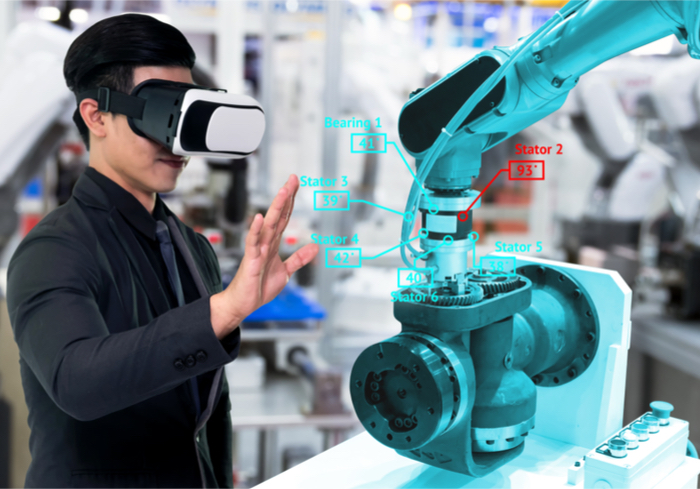How Tech Companies Are Backing The Future Of Retail Through AR, AI And Drones

Tech companies are spending big on research and development (R&D). In 2017, for example, FactSet found that five U.S. tech companies invested a total of $76 billion in the field last year, Recode reported.
Amazon spent the most on R&D by far. The eCommerce retailer invested $22.6 billion in R&D in 2017, which was 41 percent more than it did in 2016.
But Amazon is hardly alone and joins Alphabet, Microsoft, Apple and Facebook as big R&D spenders. Here’s how these companies are investing in R&D — and ushering in the next generation of retail technology.
— Amazon spent $22.6 billion in R&D in 2017. For example, last year Amazon acquired Manhattan-based artificial intelligence (AI) 3-D body-scanning startup Body Labs, according to reports from TechCrunch. The price associated with the deal has not been disclosed, but the news site’s sources have suggested a range of $70 million to $100 million. Founded in 2013, the software company uses AI and computer vision technology to create 3-D human body models that are true to life and have myriad real-world and B2B software applications — including trying on virtual clothing and creating avatars for video games. The startup raised more than $10 million through two investment rounds and saw $8 million in Series A funding in November 2015.
— Alphabet spent $16.6 billion in R&D in 2017. Google is aiming to get more augmented reality (AR) on Android mobile phones and released a mobile developer tool in 2017 to meet that end. In a blog post announcing the news, Dave Burke, VP of Android engineering at Alphabet-owned Google, said the company has been developing the technologies to run mobile AR over the last three years via Tango and that ARCore builds off those efforts but works with any hardware. “ARCore will run on millions of devices, starting today (Aug. 29) with the Pixel and Samsung’s S8, running 7.0 Nougat and above. We’re targeting 100 million devices at the end of the preview. We’re working with manufacturers like Samsung, Huawei, LG, ASUS and others to make this possible with a consistent bar for quality and high performance,” Burke wrote. The Google AR/VR software aids mobile apps and websites in tracking and overlaying physical objects in virtual worlds.
— Microsoft spent $12.3 billion in R&D in 2017. Microsoft Ventures, the venture capital arm of the Redmond, WA–based software giant, led a $26 million venture round in 2017 in AirMap, a drone startup that is the main producer of software that manages air traffic for drones. According to AirMap, its real-time traffic management software is used by about 80 percent of all drones around the globe. Microsoft’s decision to get into the drone market comes at a time when companies are in a race to become big players in what is expected to become a huge market opportunity for a slew of industries, from delivery companies like UPS to software makers such as Microsoft. Amazon, a pioneer in drones, sees unmanned aerial aircraft as the perfect way to get packages in the hands of customers who are used to instant gratification.
— Apple spent $11.6 billion in R&D in 2017. With Apple Pay Cash, mobile wallet users can send and receive money from friends and family through their phones. Users who download iOS11 or watchOS 4 can pay and receive money via the iMessenger messaging app or have virtual assistant Siri do the paying for them via voice command. Apple Pay Cash is reportedly arriving in more countries, with users in Brazil, Ireland and Spain seeing the payment service appear on their Messenger app. That’s according to Engadget, which said on Flipboard that the peer-to-peer (P2P) payment service appearing in the iOS messaging app is a sign the payment method is coming to those countries shortly. Apple hasn’t made an official announcement yet. The report noted it’s not likely that the ability to send money between countries will be possible. Apple Pay Cash, as it stands now, lets consumers only pay in their home countries.
— Facebook spent $7.8 billion in R&D in 2017. Facebook recently made a play to up its P2P payments cred as other social media and messaging services break into the space. While Facebook’s Messenger app has enabled peer-to-peer payment since 2015, the latest upgrade sees the company rolling out group payment options for Android mobile and desktop users. The new functionality allows users to pay either everyone in the chat group or individual members. No word yet on when Facebook will make group pay options available for iOS. The move comes as Snapchat and China’s WeChat have joined the social P2P space. Social messaging company Kik also recently announced its plans to enable in-app payments. The one thing Messenger certainly has over the competition is its large user base. Currently, Facebook Messenger sees over 1 billion monthly users globally.